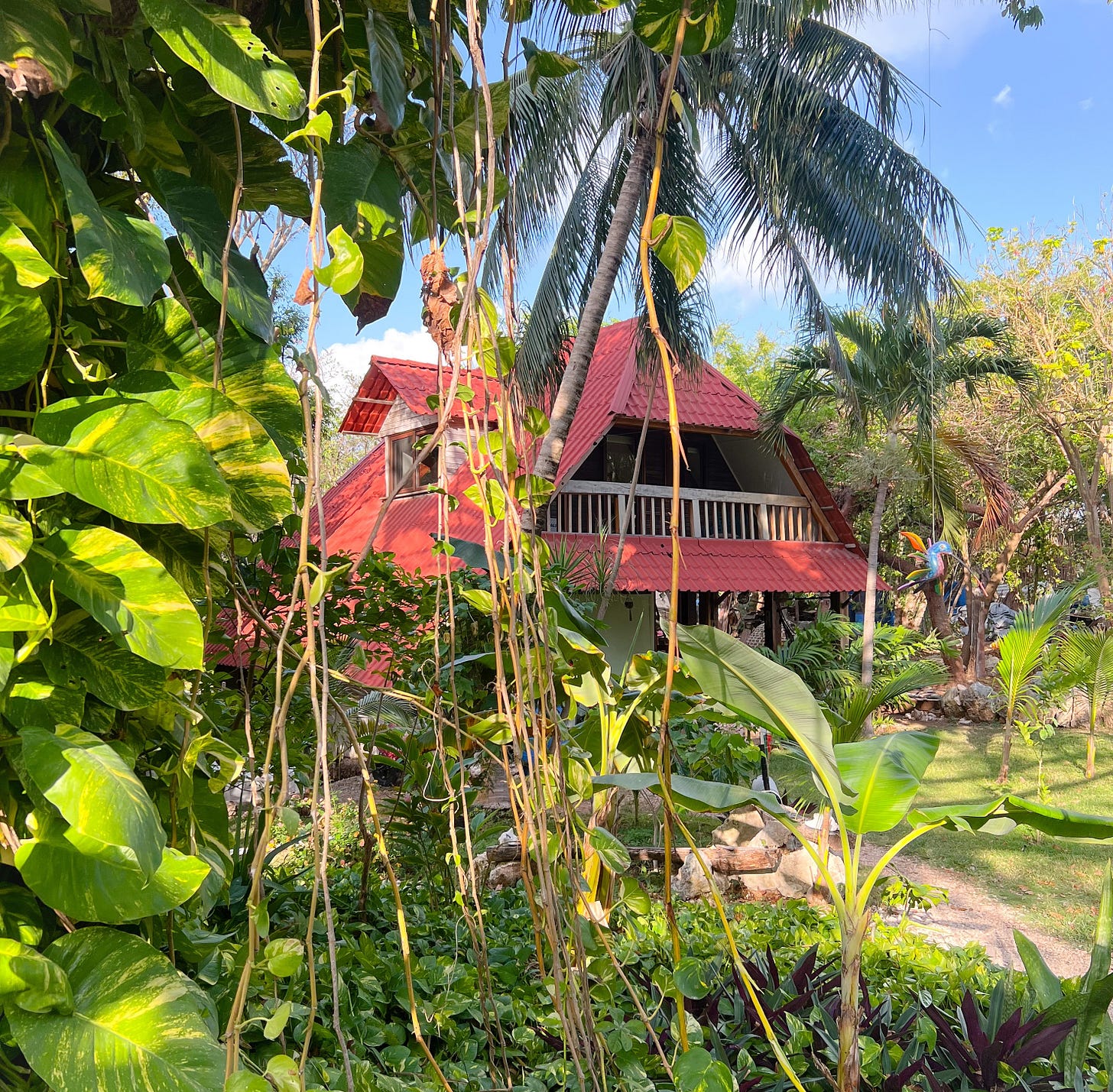“Whatever else travel is, it’s also a chance to dream and remember.”
When you're in love with a Greek girl named Vas, you don’t so much walk through life as get tumbled into it. She’s footloose in the most wonderful way - a compass always tilting toward adventure. I often find myself half-amused, half-pleading, “honey, slow down” - only to later laugh at my own sleepiness.
Because of her, my memories now include a mosaic of unlikely moments: the feel of my boots on the PCT, the awe of free diving in a tornado of jackfish, the grip of my hands climbing a granite dihedral, and the sound of my laughter swallowed up by the boom of a volcanic sky. None of these would have entered my life without her playful urgings - without her signature “c’monnn” pulling me past hesitation and into experience.
This week, her appetite for roaming landed us in the Caribbean. And like all spontaneous outings, this one brought a rich curriculum: island wisdom on freedom, beauty and where connection really comes from.
Freedom
The first lesson arrived briskly, like salt spray in the ocean wind: the life I’m leading is just one version of what’s possible - a thin slice of the infinite. Most of what I call “reality” is simply a lifestyle I’ve settled into - a pattern made up of choices, many of which I stopped questioning long ago.
With a two-hour flight and thirty-minute ferry, my world reassembled:
city apartment ⇢ beachside bungalow
familiar faces ⇢ spontaneous introductions
a routine existence ⇢ feeling the day out
meals ordered ⇢ fishes speared and served
checking the mirror ⇢ forgetting what I look like
None of these are necessarily upgrades, just alternatives. The power lies in the understanding - that all of this, all of that, is available, just on the other side of our own habits and routines. We don’t need to live differently to live better, but we do need to remember that other ways of being exist.
Travel does that - it reshuffles the furniture of the mind and reminds us that “normal” is just a local dialect. Every place has its character, and to bum around is to temporarily adopt another one. Travel is the practice of living, newly pronounced.
Beauty
The second insight is one I want stitched into the lining of my creative thinking: art and beauty don’t need to be so complicated. Some of the most charming displays we saw weren’t found in galleries or boutiques - they were local, humble, and completely unpretentious.
Seashells strung from tree branches that clinked in the breeze. Wildflowers clipped and tucked into jelly jars. Watercolor sketches of fish by the shower. Knitted dream catchers swaying above the bed. A piece of coral used as a hook for keys. A turquoise-beaded bracelet left on a conch like an offering.
Each of these carried a kind of soft power - not because they were valuable in the commercial sense, but because they captured attention and grounded it in delight. They reminded me that art doesn’t have to impress; it just has to mean something to the person who placed it there.
“We don’t see what’s in front of us; we see what’s important to us.” 1
That’s the heart of good materialism: using our physical surroundings as visual reminders of what we value - of how we want to feel and what we hope to remember. The shells hanging from the tree aren’t just shells; they’re an emblem of slowness, of presence, of the time someone took to string them there. The bracelet isn’t just senseless decoration; it’s a memory, a mood, and a gesture of generosity.
When we let beauty be simple, we make space for it to be personal. And when it’s personal, it has the power to restore us - to realign our attention and return us to a softer way of seeing.
Connection
The third - and most cherished - bit of wisdom came from our diving guide “Manu.” Canadian by birth, Mexican in spirit, he carried the kind of ease you only get from living close to the sea (“water energy” he called it). After a ten-minute rundown on spearfishing, he handed us the gear, and sent us in.
Four hours later, sun-soaked and pleasantly exhausted, we returned to shore with a modest bounty: two triggerfish, two lionfish, a snapper, and a hogfish. The diving and spearing were exhilarating - a return to something native and instinctual - but what came after spoke to us even more.
Rather than take the catch home, we brought it to Manu’s shop and turned it into a shared meal. He taught us how to clean and prepare the fish, soaking the pieces in lime until they tenderized into ceviche. His wife and young daughters joined us, along with a steady stream of locals - each one adding something to the table: chopped vegetables, cold beers, tostada chips, stories. At some point, another crew came by and laid down a barracuda like a final note in a well-played chord.
There wasn’t any calculation in it. No keeping tabs. Just people, presence and cooperative goodwill. We broke bread with a circle of strangers who felt - if only for a day - like longtime friends. Here are the notes I mentally scribbled:
Connection doesn't need occasion, only openness.
Some of the richest experiences in life aren’t planned - they’re offered, accepted, and expanded on by the people around us.
The magic happens when we get creative with the simple stuff.
We live in a world of locked doors and labeled lives, but sometimes all it takes is a cook-up to feel the walls soften. To remember that strangers aren’t distant by default. That communion is a kind of language. And that belonging, at its best, is improvised.
Setting the Memory
Carmody Grey








Simplemente, me encantó!!